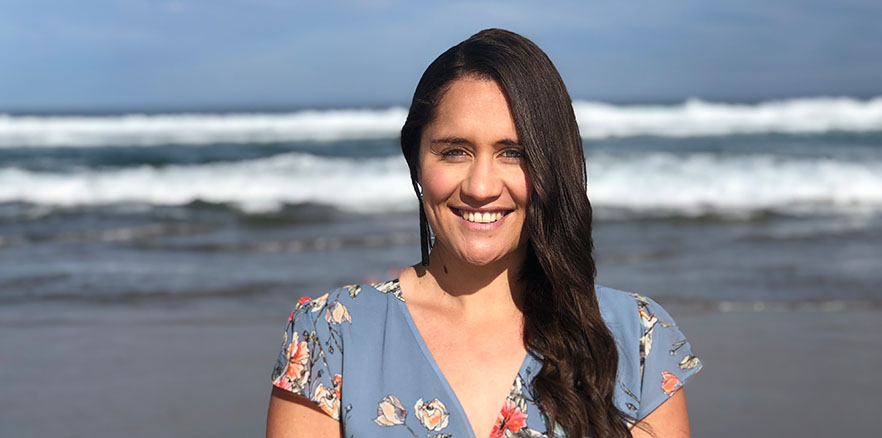
Dr Chanel Phillips.
A University of Otago researcher is having a major influence on the rethinking and rewriting of the country's approach to water safety.
Dr Chanel Phillips (Centre of Indigenous Science) recalls collecting pipi with her father and siblings as her first connection to the water, which she grew up in, on and around in the “winterless North” of Aotearoa New Zealand.
Phillips (Ngāti Hine, Ngāpuhi) went on to study Physical Education at Otago, writing a Master's thesis (with distinction) on the role of mahinga kai (traditional food gathering practices) for Māori physical education and health.
She then completed a PhD (assessed to be of exceptional quality) on Māori perspectives of water safety, in which she looked at water safety messages within Māori oral narratives, and how they might be used today to teach water safety and help reduce the high drowning rate of Māori (who comprised 17 per cent of the population and 31 per cent of drownings last year).
In the process, she devised a pioneering Māori water safety and health model, Wai Puna (wellspring of water and knowledge), which she says provides a holistic connection to water that goes far beyond learning water safety skills alone and practices such as wearing a life jacket.
Phillips explains that Wai Puna is centred on strengthening traditional connections with water and improving water safety knowledge, attitudes and behaviour through understanding whakapapa (ancestral) links to water, mātauranga (traditional knowledge) derived from ancestors' experiences with water, and tikanga (practices) in the water.
Wai Puna in turn has laid the foundations for a research project at Otago funded by the Health Research Council, tasked with creating a water safety programme for Māori families.
The lecturer in Māori Physical Education and Health says that she and other team members have been working with Māori communities in Otago, Waikato and Northland, drawing on their environmental and cultural knowledge around waterbased activities – such as fishing, food gathering and diving – to develop key Māori water safety skills and competencies. The aim is to roll out the programme nationwide.
Phillips is a principal investigator, along with her Otago colleague and mentor, Associate Professor Anne-Marie Jackson, and Dr Jordan Waiti of Waikato University.
“While Māori are over-represented in drowning statistics, drowning prevention strategies have largely neglected Māori perspectives on water safety,” Phillips says.
There are, however, signs of what she describes as “a significant shift” in outlook. Her Wai Puna model has underpinned Water Safety New Zealand's latest water safety sector strategy, Wai Ora Aotearoa; and it is influencing the Ministry of Transport's current policy development review for recreational safety and search and rescue.
The model has also been used in the monitoring and evaluation of a Māori water safety initiative funded by the Accident Compensation Corporation (ACC); and in the development of a Māori water safety resource for children.
In addition to her researching and teaching roles, Phillips is a co-director of Te Koronga Indigenous Science Research Theme.
Funding
- Health Research Council of New Zealand
- Ngā Pae o te Māramatanga
- University of Otago Te Koronga Indigenous Science Research Theme
Recent awards
- Division of Sciences Innovation in Māori or Pasifika Course Content (2020)
- Sciences Divisional List of Exceptional Doctoral Theses (2019)
More stories about early career researchers
This story is part of the research publication 'He Kitenga 2022: Talented Futures', which presents the different pathways into research that early career researchers follow.
